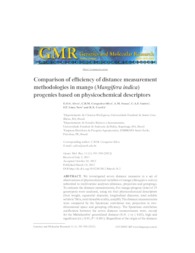Comparison of efficiency of distance measurement methodologies in mango (Mangifera indica) progenies based on physicochemical descriptors.
Comparison of efficiency of distance measurement methodologies in mango (Mangifera indica) progenies based on physicochemical descriptors.
Author(s): ALVES, E. O. S.; SILVA, C. B. M. C.; SOUZA, A. M.; SANTOS, C. A. F.; LIMA NETO, F. P.; CORRÊA, R. X.
Summary: We investigated seven distance measures in a set of observations of physicochemical variables of mango (Mangifera indica) submitted to multivariate analyses (distance, projection and grouping). To estimate the distance measurements, five mango progeny (total of 25 genotypes) were analyzed, using six fruit hysicochemical descriptors (fruit weight, equatorial diameter, longitudinal diameter, total soluble solids in °Brix, total titratable acidity, and pH). The distance measurements were compared by the Spearman correlation test, projection in two-dimensional space and grouping efficiency. The Spearman correlation coefficients between the seven distance measurements were, except for the Mahalanobis’ generalized distance (0.41 ? rs ? 0.63), high and significant (rs ? 0.91; P < 0.001). Regardless of the origin of the distance matrix, the unweighted pair group method with arithmetic mean grouping method proved to be the most adequate. The various distance measurements and grouping methods gave different values for distortion (-116.5 ? D ? 74.5), cophenetic correlation (0.26 ? rc ? 0.76) and stress (-1.9 ? S ? 58.9). Choice of distance measurement and analysis methods influence the characterization of genetic variability, and this should be taken into account for studies of mango.
Publication year: 2012
Types of publication: Journal article
Unit: Embrapa Semi-arid Region
Observation
Some of Embrapa's publications are published as ePub files. To read them, use or download one of the following free software options to your computer or mobile device. Android: Google Play Books; IOS: iBooks; Windows and Linux: Calibre.
Access other publications
Access the Agricultural Research Database (BDPA) to consult Embrapa's full library collection and records.
Visit Embrapa Bookstore to purchase books and other publications sold by Embrapa.

